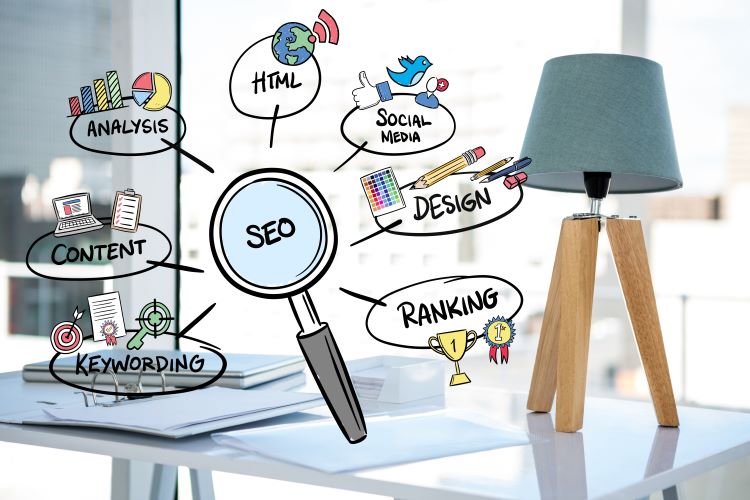Published By: Admin Views: 481 Published: Fri 13 Oct 2023
In a digital world where information flows at the speed of light, getting your website noticed can be a real challenge. This is where Search Engine Optimization, or SEO, comes into play. SEO is the magic trick that can help your website climb the rankings on search engines like Google. Search Engine Optimization is the practice of optimizing your website or blog to rank higher in search engine results pages (SERPs). When someone searches for a topic or keyword relevant to your blog, you want your content to appear at the top of the results, or at least on the first page. But did you know that there are different types of SEO? Let's break them down in simple terms so you can better understand how to improve your online presence. There are four types of SEO: On page SEO, off page SEO, Technical SEO, and Local SEO.
On-Page SEO: Imagine your website as a well-organized library. On-page SEO is like ensuring that every book on the shelf is properly categorized, labeled, and easy to find. It involves optimizing individual pages on your website to make them more attractive to search engines and human visitors. Off-Page SEO: Now, think of your website as a popular book in the library. Off-page SEO is about what others say about your book, and their opinions matter. It includes all the factors that happen outside your website but influence its reputation. Technical SEO: Technical SEO is like maintaining the infrastructure of your library. It ensures that search engines can easily navigate and understand your website. Local SEO: Local SEO is like directing visitors to the nearest branch of your library. It's crucial for brick-and-mortar businesses that want to attract customers in their local area.
In the ever-evolving world of digital content, blogging remains a powerful tool for sharing knowledge, expressing creativity, and connecting with a global audience. However, with millions of blogs competing for attention on the internet, simply creating content isn't enough. To stand out and reach your target audience, you need to incorporate effective Search Engine Optimization (SEO) strategies into your blogging efforts. we'll explore how SEO and blogging can work hand-in-hand to boost your online presence and drive organic traffic to your website.
Blogging is an essential component of a comprehensive SEO (Search Engine Optimization) strategy. It offers numerous benefits that can help improve your website's visibility and ranking in search engine results. Search engines like Google favor websites that consistently publish fresh, high-quality content. Blogging allows you to regularly update your website with new and relevant information, which can help improve your search engine ranking. Blogging provides an opportunity to target specific keywords and long-tail phrases that your target audience is likely to use in search queries. Blogging allows you to create internal links within your website.
Keyword Research: Keyword research is the foundation of successful SEO for blogs. Identify relevant keywords and phrases that your target audience is likely to search for. Tools like Google Keyword Planner, Ahrefs, or SEMrush can help you find the right keywords. Once you've selected your keywords, incorporate them naturally into your blog content, titles, and headings. Don't overdo it, though, as keyword stuffing can negatively affect your rankings.
High-Quality Content: No matter how good your SEO is, it won't make a lasting impact if your content is subpar. Blogging should always start with delivering value to your readers. Write informative, engaging, and well-structured posts that fulfill the search intent of your target audience.

On-Page Optimization: Optimizing your blog posts on the page itself is a fundamental aspect of SEO. This includes using descriptive and SEO-friendly meta titles and meta descriptions. These elements provide a brief preview of your content to users in the search results and optimizing them can increase your click-through rate (CTR).
Backlinks and Promotion: High-quality backlinks, or links from other reputable websites to your blog, are an essential part of SEO. They signal to search engines that your content is trustworthy and valuable. Promote your blog through various channels, including social media, email marketing, and guest posting, to attract backlinks and increase your blog's authority.
By understanding these four types of SEO - On-Page, Off-Page, Technical, and Local SEO - you can take the necessary steps to boost your online visibility. Just like organizing a library, SEO takes time and effort, but the rewards of increased traffic and improved visibility are well worth it. So, get started and watch your website climb the search engine ranks!
SEO plays a pivotal role in improving a website's search engine rankings. When a user searches for a specific keyword or topic, search engines strive to deliver the most relevant and valuable results. By optimizing your website with relevant keywords, high-quality content, and user-friendly design, you increase your chances of appearing on the first page of search results.

In the digital age, the synergy between SEO and blogging is undeniable. By optimizing your blog for search engines, you increase your chances of attracting a wider and more engaged audience. Remember, SEO is not a one-time effort; it requires consistent refinement and adaptation to changing search engine algorithms. So, if you're serious about building a successful blog, make SEO an integral part of your content creation process. With the right approach, your blog can become a valuable resource for your audience and a prominent presence in your niche.
Wed, 25 Sep 2024
Thu, 12 Sep 2024
Tue, 09 Jan 2024
Sat, 16 Dec 2023